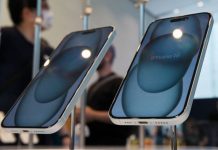
LOS ANGELES, Feb. 17 (UPI) — Apple CEO Tim Cook on Wednesday said a court order demanding the company create a “backdoor” into the cellphone data of the San Bernardino, Calif., attackers was “chilling” and “dangerous.”
In a letter to customers, Cook expressed his opposition to the court order.
“The United States government has demanded that Apple take an unprecedented step which threatens the security of our customers. We oppose this order, which has implications far beyond the legal case at hand,” Cook wrote.
“Compromising the security of our personal information can ultimately put our personal safety at risk. That is why encryption has become so important to all of us. For many years, we have used encryption to protect our customers’ personal data because we believe it’s the only way to keep their information safe. We have even put that data out of our own reach, because we believe the contents of your iPhone are none of our business.”
Cook said Apple has ” done everything that is both within our power and within the law” to help the FBI conduct its investigation into the San Bernardino massacre.
“But now the U.S. government has asked us for something we simply do not have, and something we consider too dangerous to create. They have asked us to build a backdoor to the iPhone,” Cook said.
The FBI wants Apple to make a new version of the iPhone operating system that will circumvent several security features once installed on an iPhone recovered during the San Bernardino investigation, Cook added.
“In the wrong hands, this software — which does not exist today — would have the potential to unlock any iPhone in someone’s physical possession,” Cook writes.
The data on the attackers’ phone might tell investigators what the couple was doing between their attack at a office holiday party on Dec. 2 and their deaths in a firefight with police shortly thereafter. There is an 18-minute gap in their couple’s whereabouts the FBI has been unable to fill in. The data might also tell them if the two conspired with others for the attack.
“Rather than asking for legislative action through Congress, the FBI is proposing an unprecedented use of the All Writs Act of 1789 to justify an expansion of its authority,” Cook writes. “The government would have us remove security features and add new capabilities to the operating system, allowing a passcode to be input electronically. This would make it easier to unlock an iPhone by ‘brute force,’ trying thousands or millions of combinations with the speed of a modern computer.”
The attack at the Inland Regional Center by Syed Rizwan Farook and his wife Tashfeen Malik was the deadliest terror attack on U.S. soil since Sept. 11, 2001.
Farook used an iPhone 5 issued to him by the San Bernardino County Health Department for his job as a health inspector. U.S. Magistrate Judge Sheri Pym ordered Apple to assist the FBI in disabling the passcode protection and any other security protections and complete the investigation.
“The government has been unable to complete the search because it cannot access the iPhone’s encrypted content,” U.S. Attorney. Eileen Decker wrote in a 40-page motion to the judge. “Apple has the exclusive technical means which would assist the government in completing its search, but has declined to provide that assistance voluntarily.”
The phone uses Apple’s latest iOS 9 operating system. It has an auto-wipe feature built to protect personal information like passwords, contacts, biometric data and financial data. If it can somehow be deactivated, the phone could be unlocked, but the encryption program is so strong even Apple might not be able to break it.






